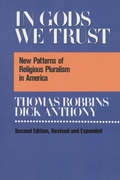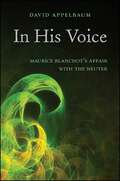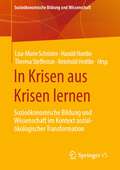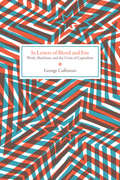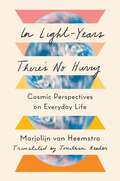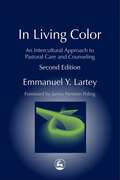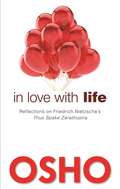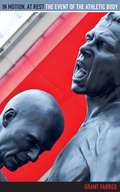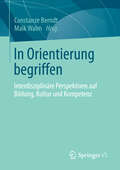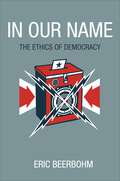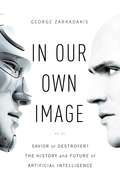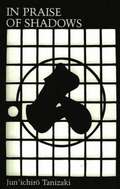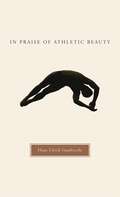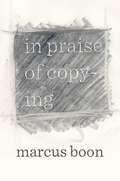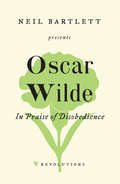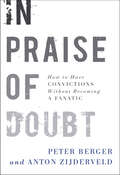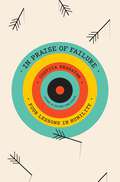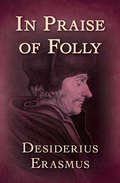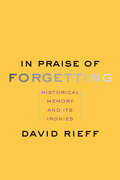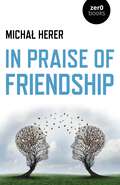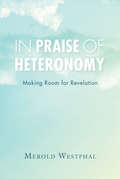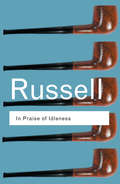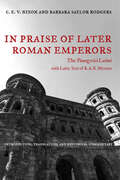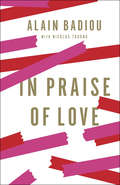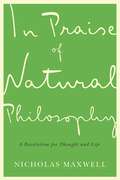- Table View
- List View
In Gods We Trust: New Patterns of Religious Pluralism in America
by Thomas RobbinsMuch has changed since publication of the first edition of this established text in the sociology of religion. Revised and expanded, this edition emphasizes new patterns of religious change and conflict emerging in the United States in the latter part of the twentieth century. Leading scholars describe and analyze developments in five main areas: The fundamentalist and evangelical revival; challenge and renewal in mainline churches; spiritual innovation and the so-called New Age; women's movements and issues and their impact; and politics and civil religion.Chapters include an examination of religious movements' responses to AIDS; Christian schools; quasi-religions; healing rites and goddess worship; recruitment of women to charismatic and Hassidic groups,; televangelists and the Christian Right; racist rural populism; contemporary Mormonism and its growth; cults and brainwashing; Jonestown; dissidence in the Catholic church; and trance-channeling, among other topics.A new introductory chapter by the editors establishes an integrating framework in terms of three themes: increasing conflict and controversy associated with American religion; increasing focus on various forms of power in American religion; and challenges to models of secularization and modernization inherent in religious revival, innovation, and politicization. A concluding chapter by the editors looks at new trends and assesses their possible impact in coming years.Like its predecessor, this outstanding collection is a significant contribution to the literature as well as a valuable resource for the classroom.
In His Voice: Maurice Blanchot's Affair with the Neuter
by David AppelbaumIn His Voice considers the idea of the neuter in Maurice Blanchot's work, and seeks to work out through an exercise of literary impersonation, or ventriloquism, how and why Blanchot relied on this form. Neither active nor passive, the neuter expresses a kind of third voice beyond the command of the author, one that speaks paradoxically of what lies outside of speaking but nonetheless exerts an irrepressible influence on thought. The neuter is exilic, messianic, and fragmentary. Since it cannot be directly accounted for, Blanchot uses a number of indirect approaches—notably, myth—to announce the key elements of his view. Orpheus, Odysseus, and principally Narcissus figure his conception and elaborate the operation of giving voice. Through a distillation of Blanchot's narrative and critical texts—focusing on the late works, The Step Not Beyond, and The Writing of the Disaster—and through an emphasis on performance, In His Voice enacts the event of writing in search of how author's inscriptive reality appears in the world.
In Krisen aus Krisen lernen: Sozioökonomische Bildung und Wissenschaft im Kontext sozial-ökologischer Transformation (Sozioökonomische Bildung und Wissenschaft)
by Reinhold Hedtke Lisa-Marie Schröder Harald Hantke Theresa SteffestunDas zu Beginn der Corona-Krise heraufbeschworene „neue Normal“ wird von Krisen geprägt sein. Schon früher traten miteinander verwobene Krisen wie die Finanz- und Wirtschaftskrise 2007 ff., die Staatsschulden- und Eurokrise 2010, Armutskrisen oder die Krisen der liberalen Demokratie, etwa durch den Rechtspopulismus, zutage. Die Pandemie ist allgegenwärtig, das Klima bildet den Inbegriff einer Dauerkrise, die weitere Krisen evozieren wird. Die Omnipräsenz von Krisen fordert die Gesellschaft heraus.Dieser Themenband widmet sich dem Umgang mit Krisen aus der Perspektive sozioökonomischer Bildung und Wissenschaft. Ausgehend von den Erfahrungen des Lehrens und Lernens in Krisen erörtern die Beiträge u. a. folgende Fragen: Welche Bildungsinhalte, -formen und -politiken helfen, um in Krisen aus Krisen zu lernen? Welche Wege zum Umgang mit dem Dauerkrisenzustand bietet die sozioökonomische Wissenschaft? Neben programmatischen, theoretischen und historischen Abhandlungen stellt der Band Lehr-Lernformate dar, die diese Herausforderung angenommen haben. Präsentiert werden fachdidaktische und fachwissenschaftliche Antworten auf multiple Krisen als Inspiration für Ansätze und Aktivitäten einer kritisch-transformativen sozioökonomischen Bildung und Wissenschaft.
In Letters of Blood and Fire: Work, Machines, and the Crisis of Capitalism (Common Notions)
by George CaffentzisAlthough information technology, immaterial production, financialization, and globalization have been trumpeted as inaugurating a new phase of capitalism that transcends its violent origins, this collection of essays by autonomist Marxist George Caffentzis argues that instead of being in a period of major social and economic novelty, the course of the last decades has been a return to the vehement conflicts present at the advent of capitalism. Emphasizing class struggles that have proliferated across the social body of global capitalism, Caffentzis shows how these struggles are so central to the dynamic of the system that even the most sophisticated machines cannot liberate capitalism from class struggle and the need for labor. The writings draw upon a careful rereading of Marx's thought in order to elucidate political concerns of the day and document the peculiar way in which capital perpetuates violence and proliferates misery on a world scale.
In Light-Years There's No Hurry: Cosmic Perspectives on Everyday Life
by Marjolijn van HeemstraHow seeing Earth through the eyes of an astronaut brings new wonder and meaning to life on our planet. One stifling summer night, the poet and journalist Marjolijn van Heemstra lay awake, unable to sleep—like so many of us feeling anxious and alienated, deeply exhausted yet restless. Amid the suffocating stream of daily obligations, the clamor of notifications and increasingly dismal headlines, she longed for a way to rise above the frenzy, for a renewed sense of meaning and connection. Then she learned about the overview effect—a permanent shift in consciousness many astronauts experience when beholding Earth from outside the atmosphere—and wondered: could the perspective of outer space offer the internal space she sought? The lyrical account of van Heemstra’s yearlong quest to experience the overview effect on Earth, In Light-Years There’s No Hurry invites us to lift our gaze above eye level and discover our connections with the cosmos, our planet, and each other. We follow as van Heemstra’s cosmic awareness expands and she finds herself feeling simultaneously lighter and more grounded. Compared with the complexity of the universe, daily life on Earth begins to seem more manageable, while understanding the improbability of our collective existence gives her new patience and tenderness for her neighbors. The grand rhythms of light-years and eons become a source of restoration and relief—a comforting, necessary reminder to slow down and zoom out. Contemplating the solace a cosmic perspective offers in our chaotic, divided world, In Light-Years There’s No Hurry is a moving meditation on what it is to be human amid the vastness of the universe.
In Living Color: An Intercultural Approach to Pastoral Care and Counseling Second Edition
by Emmanuel Y LarteyThe meaning of pastoral care in modern multicultural societies is challenged and reexamined from a pluralistic, global perspective in this book. Emmanuel Lartey stresses the importance of recognizing different cultural influences on individuals in order to effectively counsel, guide and empower them. He provides a clear and concise history of pastoral care and considers its relationship to different models of counseling and spirituality. This new edition has been updated to reflect postmodern and postcolonial studies and provides illustrations of how an intercultural approach can work in practice. Theological teachers and students will welcome its return as an indispensable introduction to the field of pastoral care. In Living Color is an essential source of inspiration to leaders from any religious stream who wish to provide pastoral care in a way that reflects their community's cultural diversity. This book is also a useful resource for practitioners in a wider range of caring contexts who work in multicultural environments.
In Love with Life
by Osho Osho International FoundationIn his preface to Ecce Homo, Friedrich Nietzsche says this: "With [Thus Spoke Zarathustra] I have given mankind the greatest present that has ever been made to it so far. This book, with a voice bridging centuries, is not only the highest book there is, the book that is truly characterized by the air of the heights-the whole fact of man lies beneath it at a tremendous distance-it is also the deepest, born out of the innermost wealth of truth, an inexhaustible well to which no pail descends without coming up again filled with gold and goodness."Perhaps only a contemporary mystic like Osho could truly understand what Nietzsche meant by this statement. In Love with Life shares Osho's understanding of both Nietzsche the man and of his seminal work, with extraordinary clarity and relevance to readers in the 21st century. Ten chapters have been selected from a series of 43 talks given by Osho, first published as two volumes: Zarathustra: A God that Can Dance, and Zarathustra: The Laughing Prophet. Here, Nietzsche is rescued from any remaining taint brought on by the Nazi misunderstanding and appropriation of his work, and we also learn much about the mysterious and revolutionary Persian mystic Zarathustra (Zoroaster), whom Nietzsche chose as a spokesperson.The result is an enchanting journey through a world where life is celebrated, not renounced, and where timeless truths prevail over the lies and distortions that continue to cripple our efforts to become healthy and whole.
In Motion, At Rest: The Event of the Athletic Body
by Grant FarredIn Motion, At Rest takes up the event as a philosophical problem from a novel perspective. Grant Farred examines three infamous events in sport, arguing that theorizing the event through sport makes possible an entirely original way of thinking about it.In the first event, Ron Artest committed a flagrant foul in a National Basketball Association game, which provoked fans to hurl both invectives and beer cups. Artest and some teammates then attacked the fans. Drawing from Alain Badiou, Farred suggests that this event extends far beyond Artest and into the actions of many others, including those of Rosa Parks, Jackie Robinson, and Emmett Till. In the second event Eric Cantona—a professional footballer (soccer player)—was ejected from a game. On his way to the locker room a fan verbally assaulted him, and in response Cantona kicked the fan. Farred utilizes Gilles Deleuze&’s insights on cinema to theorize &“the most famous kung-fu kick in football.&” In the third event, Zinedine Zidane, captain of the French national team, head butted an opposing player. Applying concepts from Jacques Derrida, Farred explores xenophobia and the politics of immigration.Throughout, Farred shows how what was already inherent in the event is opened to new possibilities for understanding ontological being by thinking about sport philosophically.
In Orientierung begriffen
by Constanze Berndt Maik WalmBildung, Kultur und Kompetenz spielen in Diskursen moderner Gesellschaften eine herausgehobene Rolle und stellen deshalb zentrale Referenzpunkte des (erziehungs)wissenschaftlichen Denkens dar. Die hier versammelten Beiträge zielen darauf ab, Orientierungspunkte zu geben, um disziplinäre Standortbestimmungen zu befördern und Institutionen wie Kindertagesstätten, Schulen und Hochschulen kritisch zu analysieren und reflektiert zu begleiten.
In Our Name: The Ethics of Democracy
by Eric BeerbohmWhen a government in a democracy acts in our name, are we, as citizens, responsible for those acts? What if the government commits a moral crime? The protestor's slogan--"Not in our name!"--testifies to the need to separate ourselves from the wrongs of our leaders. Yet the idea that individual citizens might bear a special responsibility for political wrongdoing is deeply puzzling for ordinary morality and leading theories of democracy. In Our Name explains how citizens may be morally exposed to the failures of their representatives and state institutions, and how complicity is the professional hazard of democratic citizenship. Confronting the ethical challenges that citizens are faced with in a self-governing democracy, Eric Beerbohm proposes institutional remedies for dealing with them. Beerbohm questions prevailing theories of democracy for failing to account for our dual position as both citizens and subjects. Showing that the obligation to participate in the democratic process is even greater when we risk serving as accomplices to wrongdoing, Beerbohm argues for a distinctive division of labor between citizens and their representatives that charges lawmakers with the responsibility of incorporating their constituents' moral principles into their reasoning about policy. Grappling with the practical issues of democratic decision making, In Our Name engages with political science, law, and psychology to envision mechanisms for citizens seeking to avoid democratic complicity.
In Our Own Image: Savior or Destroyer? The History and Future of Artificial Intelligence
by George ZarkadakisA timely and important book that explores the history and future, as well as the societal and ethical implications, of Artificial Intelligence as we approach the cusp of a fourth industrial revolution Zarkadakis explores one of humankind's oldest love-hate relationships—our ties with artificial intelligence, or AI. He traces AI's origins in ancient myth, through literary classics like Frankenstein, to today's sci-fi blockbusters, arguing that a fascination with AI is hardwired into the human psyche. He explains AI's history, technology, and potential; its manifestations in intelligent machines; its connections to neurology and consciousness, as well as—perhaps most tellingly—what AI reveals about us as human beings. In Our Own Image argues that we are on the brink of a fourth industrial revolution—poised to enter the age of Artificial Intelligence as science fiction becomes science fact. Ultimately, Zarkadakis observes, the fate of AI has profound implications for the future of science and humanity itself.
In Praise Of Shadows
by Edward G. Seidensticker Charles Moore Jun'Ichirō Tanizaki Thomas J. HarperAn essay on aesthetics by the Japanese novelist, this book explores architecture, jade, food, and even toilets, combining an acute sense of the use of space in buildings. The book also includes descriptions of laquerware under candlelight and women in the darkness of the house of pleasure. This was originally written in 1933, between World Wars I and II. The changes in Japan after WWII make this a period piece. This translation has won a major translation award.
In Praise of Athletic Beauty
by Hans Ulrich Gumbrecht“A thought-provoking—and academically rigorous—defense of the grace and aesthetic worth of sports.” —Sports IllustratedBy the hundreds of millions we show up, stand in line, turn on, and tune in to watch, mesmerized, as athletes perform. And yet this experience, so widely craved and intensely felt, we commonly dismiss as “only a game.” A book that looks beyond the usual explanations of why sports fascinates, In Praise of Athletic Beauty also strives for a language that can frame—even enhance—the pleasure we take in watching athletic events.The vicarious thrill, anxiety release, competitive spirit: in place of these traditional answers to the mystery of sports’ allure, Hans Ulrich Gumbrecht proposes a more powerful and provocative alternative. The fascination with watching sports, he argues, is probably the most popular and potent contemporary form of aesthetic experience—in the classic, very literal sense of this concept. In exploring this idea, Gumbrecht develops a lucid reflection on the pleasures of sports spectatorship and the nature of athletic beauty. Where we might readily pronounce certain athletic moves and plays “beautiful,” this book gives us the means to explore, understand, and enjoy even more acutely the aesthetic experience that our words-in-passing barely suggest.With a new perspective on the appreciation of—and, indeed, a new tone of praising—sports, Gumbrecht also offers a new way of narrating the history of athletics and a fresh vocabulary for analyzing various sports. Exploring athletic beauty, this book makes us understand the widespread passion sport inspires as an untamed form of aesthetic fascination.
In Praise of Copying
by Marcus BoonThis book is devoted to a deceptively simple but original argument: that copying is an essential part of being human, that the ability to copy is worthy of celebration, and that, without recognizing how integral copying is to being human, we cannot understand ourselves or the world we live in. In spite of the laws, stigmas, and anxieties attached to it, the word “copying” permeates contemporary culture, shaping discourse on issues from hip hop to digitization to gender reassignment, and is particularly crucial in legal debates concerning intellectual property and copyright. Yet as a philosophical concept, copying remains poorly understood. Working comparatively across cultures and times, Marcus Boon undertakes an examination of what this word means—historically, culturally, philosophically—and why it fills us with fear and fascination. He argues that the dominant legal-political structures that define copying today obscure much broader processes of imitation that have constituted human communities for ages and continue to shape various subcultures today. Drawing on contemporary art, music and film, the history of aesthetics, critical theory, and Buddhist philosophy and practice, In Praise of Copying seeks to show how and why copying works, what the sources of its power are, and the political stakes of renegotiating the way we value copying in the age of globalization.
In Praise of Disobedience: The Soul of Man Under Socialism and Other Works
by Oscar Wilde Neil BartlettWorks of Wilde's annus mirabilis of 1891 in one volume, with an introduction by renowned British playwright.The Soul of Man Under Socialism draw on works from a single miraculous year in which Oscar Wilde published the larger part of his greatest works in prose -- the year he came into maturity as an artist. Before the end of 1891, he had written the first of his phenomenally successful plays and met the young man who would win his heart, beginning the love affair that would lead to imprisonment and public infamy.In a witty introduction, playwright, novelist and Wilde scholar Neil Bartlett explains what made this point in the writer's life central to his genius and why Wilde remains a provocative and radical figure to this day.Included here are the entirety of Wilde's foray into political philosophy, The Soul of Man Under Socialism; the complete essay collection Intentions; selections from The Portrait of Dorian Gray as well as its paradoxical and scandalous preface; and some of Wilde's greatest fictions for children. Each selection is accompanied by stimulating and enlightening annotations. A delight for fans of Oscar Wilde, In Praise of Disobedience will revitalize an often misunderstood legacy.
In Praise of Doubt: How to Have Convictions Without Becoming a Fanatic
by Peter Berger Anton ZijderveldIn Praise of Doubt explores how to survive the political, moral, and religious challenges raised by the extreme poles of relativism and fundamentalism.In this insightful and thought-provoking book, two world-renowned social scientists, Peter L. Berger and Anton C. Zijderveld, ask and answer Big Questions, offering invaluable guidance on how to have convictions without becoming a fanatic.“A book of great practical wisdom by authors who have profound insight into the intellectual dynamics governing contemporary life.” —Dallas Willard, author of Knowing Christ Today“The virus of fanaticism takes several forms. In Praise of Doubt targets two: fundamentalists and relativists. . . . Bracing . . . lay-friendly and seasoned with humor.” —The Boston Globe“The best parts of In Praise of Doubt explore the cultural battlegrounds where a consensus has broken down or not yet coalesced . . . Berger and Zijderveld are optimistic: They believe that moral progress is on the march and that moderation is a virtue everyone can agree on.” —The Wall Street Journal“This is . . . a serious attempt to explain how to find middle ground between conviction—religious and otherwise—and doubt . . . In fact, Berger and Zijderveld argue that doubt—especially as expressed in the idea of a loyal opposition—is at the heart of a democratic system.” —Los Angeles Times“This book addresses, both broadly and individually, how to balance dedication to strong religious and moral beliefs, while simultaneously being objective and discerning. This book grapples, in a thoughtful, entertaining way with these and other meaty philosophical questions.” —Reference & Research Book News
In Praise of Failure: Four Lessons in Humility
by Costica BradatanSquarely challenging a culture obsessed with success, an acclaimed philosopher argues that failure is vital to a life well lived, curing us of arrogance and self-deception and engendering humility instead.Our obsession with success is hard to overlook. Everywhere we compete, rank, and measure. Yet this relentless drive to be the best blinds us to something vitally important: the need to be humble in the face of life’s challenges. Costica Bradatan mounts his case for failure through the stories of four historical figures who led lives of impact and meaning—and assiduously courted failure. Their struggles show that engaging with our limitations can be not just therapeutic but transformative.In Praise of Failure explores several arenas of failure, from the social and political to the spiritual and biological. It begins by examining the defiant choices of the French mystic Simone Weil, who, in sympathy with exploited workers, took up factory jobs that her frail body could not sustain. From there we turn to Mahatma Gandhi, whose punishing quest for purity drove him to ever more extreme acts of self-abnegation. Next we meet the self-styled loser E. M. Cioran, who deliberately turned his back on social acceptability, and Yukio Mishima, who reveled in a distinctly Japanese preoccupation with the noble failure, before looking to Seneca to tease out the ingredients of a good life.Gleefully breaching the boundaries between argument and storytelling, scholarship and spiritual quest, Bradatan concludes that while success can make us shallow, our failures can lead us to humbler, more attentive, and better lived lives. We can do without success, but we are much poorer without the gifts of failure.
In Praise of Folly: With Illustrations After Hans Holbein, And A Portrait, Together With A Life Of Erasmus And His Epistle Addressed To Sir Thomas Mor
by Desiderius ErasmusThis sixteenth-century religious satire by a Renaissance critic and theologian is &“a masterpiece of humor and wise irony&” (Johan Huizinga, Dutch historian). At the onset of his hugely successful satire of medieval European society, Dutch scholar Desiderius Erasmus invokes the goddess Folly, daughter of Youth and Wealth, who was raised by Drunkenness and Ignorance. She&’s followed by idolatrous companions, including Self-love, Flattery, Pleasure, and Laziness. Through Folly&’s wry and humorous speech, Erasmus denounces the superstitions and nonsensical eccentricities of his contemporary theologians and churchmen, monastic life, and the condition of the Catholic Church. An immensely influential humanist text, In Praise of Folly helped lay the groundwork for the Protestant Reformation and marked a transitional time between medieval beliefs and modern ideals.
In Praise of Forgetting: Historical Memory and Its Ironies
by David RieffThe conventional wisdom about historical memory is summed up in George Santayana's celebrated phrase, "Those who cannot remember the past are condemned to repeat it. " Today, the consensus that it is moral to remember, immoral to forget, is nearly absolute. And yet is this right? David Rieff, an independent writer who has reported on bloody conflicts in Africa, the Balkans, and Central Asia, insists that things are not so simple. He poses hard questions about whether remembrance ever truly has, or indeed ever could, "inoculate" the present against repeating the crimes of the past. He argues that rubbing raw historical wounds--whether self-inflicted or imposed by outside forces--neither remedies injustice nor confers reconciliation. If he is right, then historical memory is not a moral imperative but rather a moral option--sometimes called for, sometimes not. Collective remembrance can be toxic. Sometimes, Rieff concludes, it may be more moral to forget. Ranging widely across some of the defining conflicts of modern times--the Irish Troubles and the Easter Uprising of 1916, the white settlement of Australia, the American Civil War, the Balkan wars, the Holocaust, and 9/11--Rieff presents a pellucid examination of the uses and abuses of historical memory. His contentious, brilliant, and elegant essay is an indispensable work of moral philosophy.
In Praise of Friendship
by Michal HererWe are living in the age of decline, or at least crisis, of what might be called a &‘culture of friendship&’. Our existence as social beings is constricted in a triangle whose three apices are: the alienated work, subjected to the principle of ruthless competition, the closed, isolated nuclear family and the national or &‘cultural&’ community constituted in the act of aggression towards a common enemy (the &‘alien&’). It is precisely this constriction that makes the culture of friendship decline, and vice versa: it is this decline that seems to make any other way of life increasingly harder to imagine. However, if we are to resist the temptation of returning to the logic of clashing, violent particularisms and defend ourselves against fascist or fascistoid tendencies that appear on the political horizon, some kind of opening must occur, we must once again be able to experiment with new forms of being together, despite divisions resulting from territorial and cultural identities or family relations. What we need is a renaissance of the culture of friendship. Originally published in Poland, this edition from Zero Books is the first English language publication of In Praise of Friendship.
In Praise of Heteronomy: Making Room for Revelation
by Merold WestphalRecognizing the essential heteronomy of postmodern philosophy of religion, Merold Westphal argues against the assumption that human reason is universal, neutral, and devoid of presupposition. Instead, Westphal contends that any philosophy is a matter of faith and the philosophical encounter with theology arises from the very act of thinking. Relying on the work of Spinoza, Kant, and Hegel, Westphal discovers that their theologies render them mutually incompatible and their claims to be the voice of autonomous and universal reason look dubious. Westphal grapples with this plural nature of human thought in the philosophy of religion and he forwards the idea that any appeal to the divine must rest on a historical and phenomenological analysis.
In Praise of Idleness: And Other Essays
by Bertrand RussellIntolerance and bigotry lie at the heart of all human suffering. So claims Bertrand Russell at the outset of In Praise of Idleness, a collection of essays in which he espouses the virtues of cool reflection and free enquiry; a voice of calm in a world of maddening unreason. From a devastating critique of the ancestry of fascism to a vehement defence of 'useless' knowledge, with consideration given to everything from insect pests to the human soul, this is a tour de force that only Bertrand Russell could perform.
In Praise of Later Roman Emperors: The Panegyrici Latini (Transformation of the Classical Heritage #21)
by C. E. Nixon Barbara Saylor RodgersHere, for the first time, is an annotated English translation of the eleven later panegyrics (291-389 C.E.) of the XII Panegyrici Latini, with the original Latin text prepared by R. A. B. Mynors. Each panegyric has a thorough introduction, and detailed commentary on historical events, style, figures of speech, and rhetorical strategies accompanies the translations. The very difficult Latin of these insightful speeches is rendered into graceful English, yet remains faithful to the original.
In Praise of Love
by Alain Badiou Nicolas TruongThe renowned French philosopher&’s &“ode to love&’s power to unite in the face of eternity, and its optimism in the face of pain&” (Publishers Weekly). In a world rife with consumerism, where online dating promises risk-free romance and love is all too often seen as a mere variant of desire and hedonism, Alain Badiou believes that love is under threat. Taking to heart Rimbaud&’s famous line &“love needs reinventing,&” In Praise of Love is the celebrated French intellectual&’s passionate treatise in defense of love. For Badiou, love is an existential project, a constantly unfolding quest for truth. This quest begins with the chance encounter, an event that forever changes two individuals, challenging them &“to see the world from the point of view of two rather than one.&” This, Badiou believes, is love&’s most essential transforming power. Through thought-provoking dialogue edited from a conversation between Badiou and Truong, a vibrant cast of thinkers are invoked: Kierkegaard, Plato, de Beauvoir, Proust, and more, create a new narrative of love in the face of twenty-first-century modernity. Moving, zealous, and wise, Badiou&’s &“paean to the anticapitalist, antiessentialist, unifying power of love&” urges us not to fear it but to see it as a magnificent undertaking that compels us to explore others and to move away from an obsession with ourselves (Publishers Weekly). &“Finally, the cure for the pornographic, utilitarian exchange of favors to which love has been reduced in America. Alain Badiou is our philosopher of love.&” —Simon Critchley, author of The Faith of the Faithless
In Praise of Natural Philosophy: A Revolution for Thought and Life
by Nicholas MaxwellIn Praise of Natural Philosophy argues for a transformation of both science and philosophy, so that these two distinct domains of thought become one: natural philosophy. This in turn has far-reaching consequences for the whole academic enterprise. It transpires that universities need to be reorganized so that they become devoted to seeking and promoting wisdom by rational means – as opposed to just acquiring knowledge. Modern science began as natural philosophy. What today we call science and philosophy, in Newton's time formed one integrated enterprise: to improve our knowledge and understanding of the universe. Profound discoveries were made. And then natural philosophy died. It split into science and philosophy. But the two fragments are defective shadows of the glorious unified endeavour of natural philosophy. Rigour, sheer intellectual good sense, and decisive argument demand that we put the two together again, and rediscover the immense merits of the integrated enterprise of natural philosophy. This requires an intellectual revolution, with profound consequences for how we understand the universe, do both science and philosophy, and tackle global problems. A comprehensive addition to discussions about the purposes of academia, In Praise of Natural Philosophy has dramatic implications for the fate of our world.
